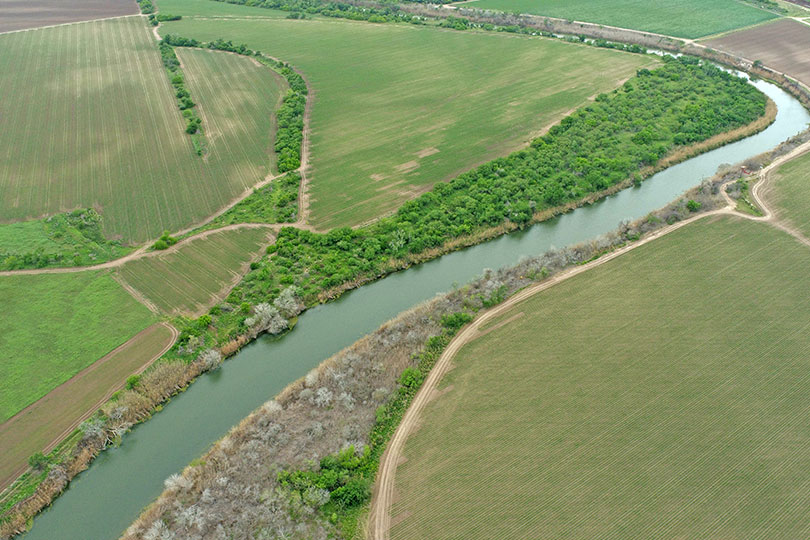By Jessica Domel
Multimedia Reporter
Legislative action to push Mexico to deliver the water it owes the United States—and farmers, ranchers and communities in South Texas—under the 1944 Water Treaty has cleared another legislative hurdle.
The House Committee on Appropriations recently passed the Fiscal Year 2025 State, Foreign Operations and Related Programs Appropriations Act in a 31-26 vote.
The bill includes language that withholds funding from Mexico until the secretary of state certifies the U.S. and Mexico have come to an agreement to balance the deficit of water owed to the United States by Mexico.
“Water is life, and water deliveries from Mexico are essential for South Texas communities to operate and grow. I was pleased to secure language in the FY25 SFOPS appropriations bill that ensures Mexico complies with the delivery terms set in the 1944 Water Treaty,” U.S. Congressman Henry Cuellar of Texas said. “As a member of Congress, it is my job to ensure communities on the border have an adequate, reliable water supply. While there is still more work to be done to make this bill bipartisan, I will continue to focus my efforts on securing immediate water deliveries from Mexico.”
The language in the bill does not withhold assistance for countering the flow of fentanyl and other synthetic drugs into the United States.
“Mexico is directed to release an average of 350,000 acre-feet of water to Texas every year on a five-year cycle,” Cuellar told the committee. “So far on this five-year cycle, which ends next year, the only thing they’ve done is deliver 400,000 out of 1.2 million acre-feet.”
The appropriations bill also includes $250,350,000 for the International Boundary and Water Commission (IBWC). That’s a 13% increase in funding from Fiscal Year 2024.
“You have funded an agency that’s so important for anybody in California, Arizona, New Mexico and Texas,” Cuellar said. “Not only do they have to negotiate the water between the U.S. and Mexico, number one, but they also provide a lot of work along to make sure that the border water infrastructure projects are important and clean drinking water for people that live along the border.”
The IBWC is responsible for applying boundary and water treaties between the U.S. and Mexico. They also manage the Falcon and Amistad international dams and are responsible for other water infrastructure and flood control projects.
Cuellar said the funding increases would help ensure IBWC can hire and retain qualified staff and would be used for construction projects to maintain critical infrastructure.
Cuellar is just one member of the Texas delegation who has been working in Congress this year to try to get Mexico to uphold its end of the 1944 Water Treaty.
Earlier this year, U.S. Sens. John Cornyn and Ted Cruz of Texas and Reps. Monica De La Cruz, Vicente Gonzalez, Tony Gonzales, Henry Cuellar, Nathaniel Moran, Ronny Jackson, Jodey Arrington and Keith Self sent a letter to the chairmen and ranking members of the House and Senate Appropriations subcommittees in May urging them to withhold funds from Mexico until they agree to resolve the ongoing water dispute.
“The 1944 Water Treaty between the United States and Mexico obligates both countries to share water resources from the Colorado and Rio Grande rivers. Despite ongoing diplomatic efforts, Mexico still fails to provide minimum, consistent water deliveries to the United States from the Rio Grande, instead waiting until the end of a five-year cycle to deliver the water owed to America. While the United States provides consistent, annual water deliveries to Mexico, the Mexican practice poses a serious threat to the agricultural, industrial, and municipal sectors in border states,” the Texas lawmakers said.
Farmers and ranchers in the Rio Grande Valley rely on the water deliveries from Mexico for irrigation and to sustain their operations. Without it, many may not be able to produce a crop this year.
“The lack of water means that our citrus farmers are unable to grow the crops that they should be able to grow. What that means to not only the people in South Texas but all Americans is that citrus prices will also increase, as well,” De La Cruz said. “This really is a national security issue when we cannot feed our people, when we cannot feed Americans. Food security truly is national security.”
The lack of water from Mexico led to the closure of the Rio Grande Valley Sugar Growers sugar mill in February as sugarcane growers are unable to produce a crop without the water.
It was the last sugar mill in Texas.
“Farmers and ranchers across South Texas remain under continued financial strain and could suffer a similar fate as the sugar industry, should Mexico continue withholding water,” the lawmakers wrote. “Additionally, the lack of reliable water delivery affects municipalities and threatens the quality of life for many American citizens living along our border.”
The appropriations bill now heads to the full House for consideration.
Ensuring Mexico delivers the water owed to South Texas is a national legislative priority for Texas Farm Bureau.
This year, Texas Farm Bureau coordinated a meeting between Rio Grande Valley farmers and the International Boundary and Water Commission, U.S. Department of State, National Security Council, U.S. Department of Agriculture, U.S. Bureau of Reclamation and White House staff to discuss the ongoing issue.
De La Cruz has also met with the secretary of state on the issue. At the time, the secretary told De La Cruz Mexico was focused on its presidential election.
That election has since been held, with Claudia Sheinbaum being named the first female president in Mexico’s history.
“They felt that it would have to wait until after the election before real conversations could be made in regards to fulfilling the 1944 water treaty,” De La Cruz told the Texas Farm Bureau Radio Network June 14. “We have not had any kind of response from the secretary of state unfortunately about this treaty and Mexico’s compliance to the water deficit.”


Leave A Comment